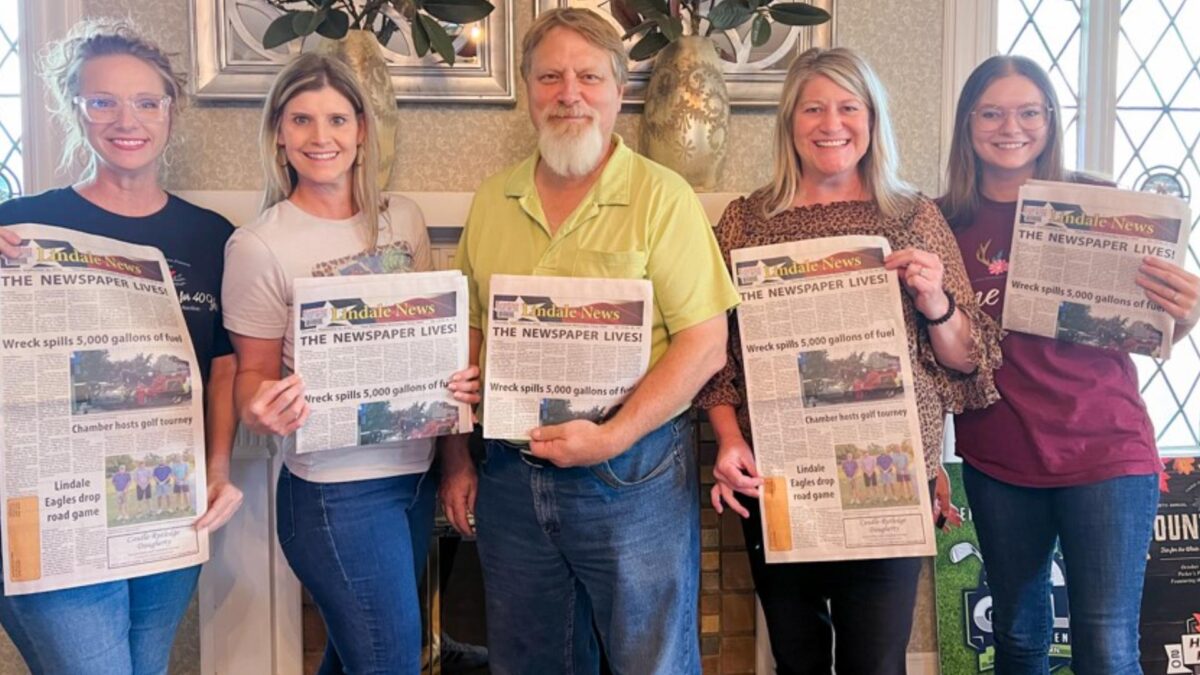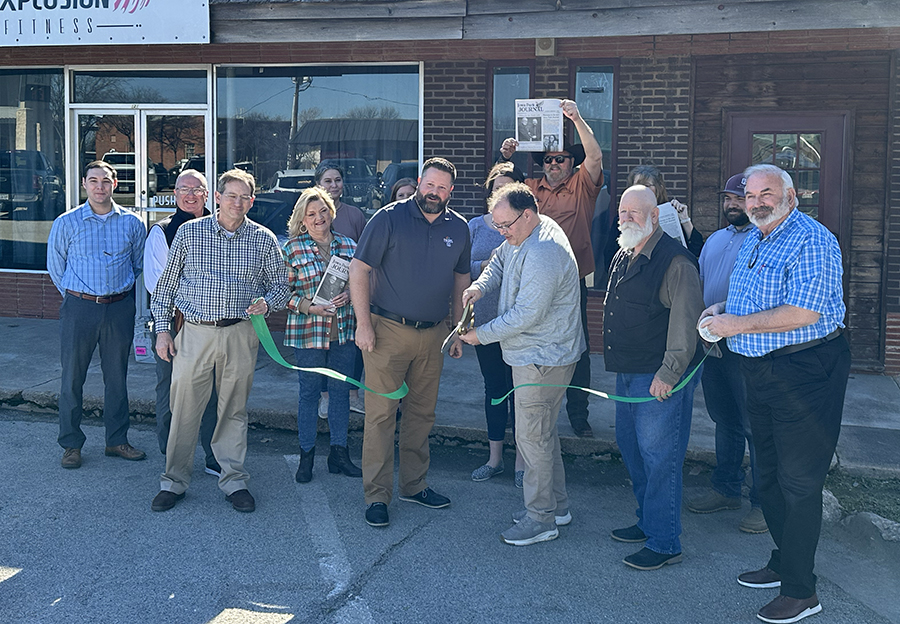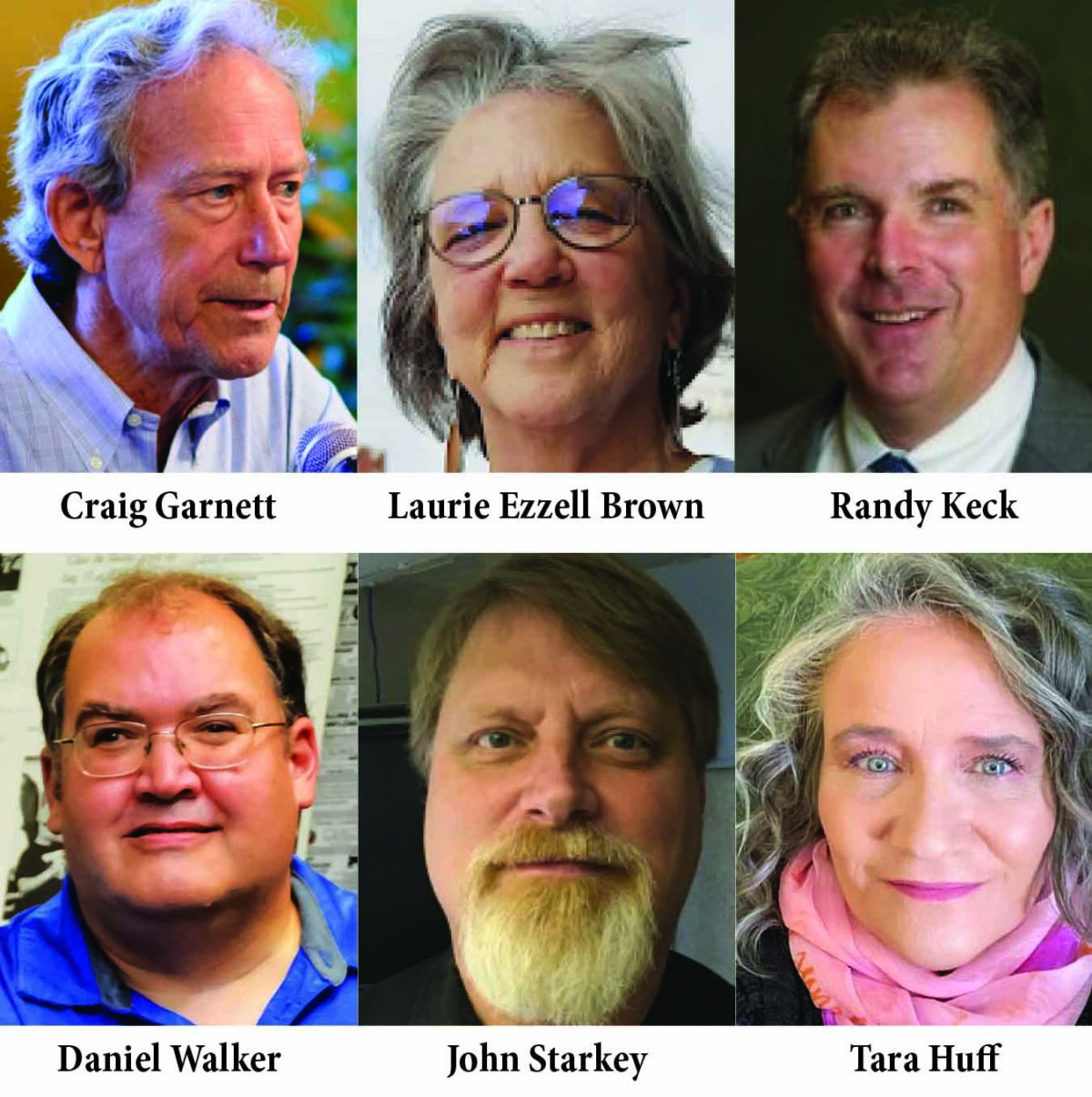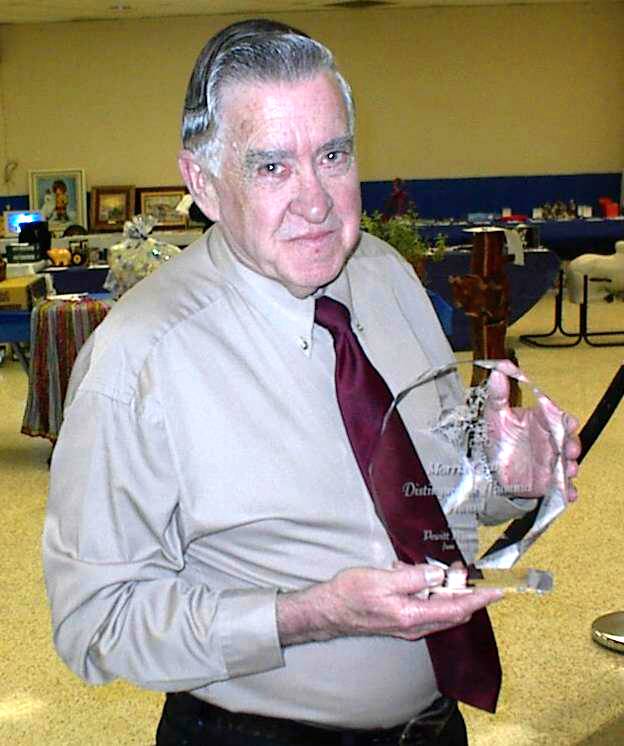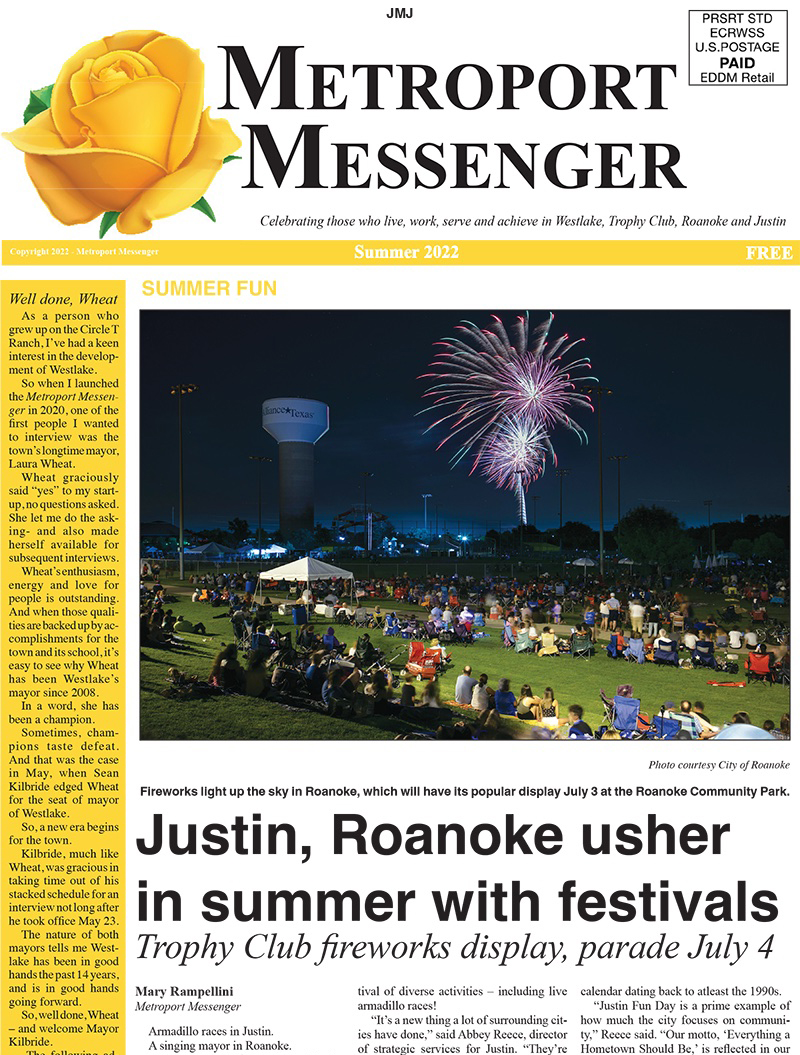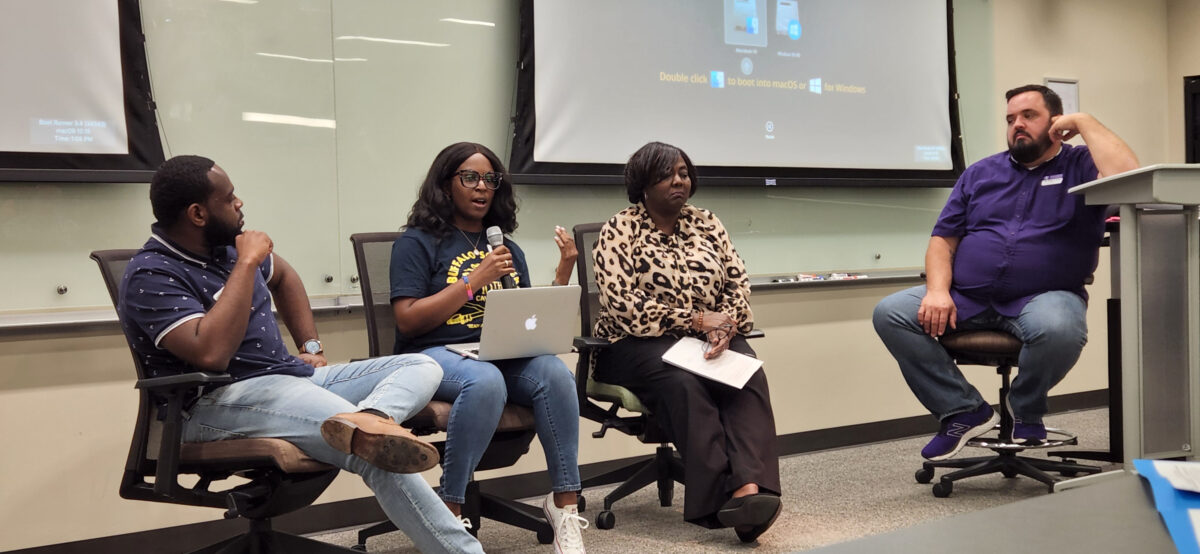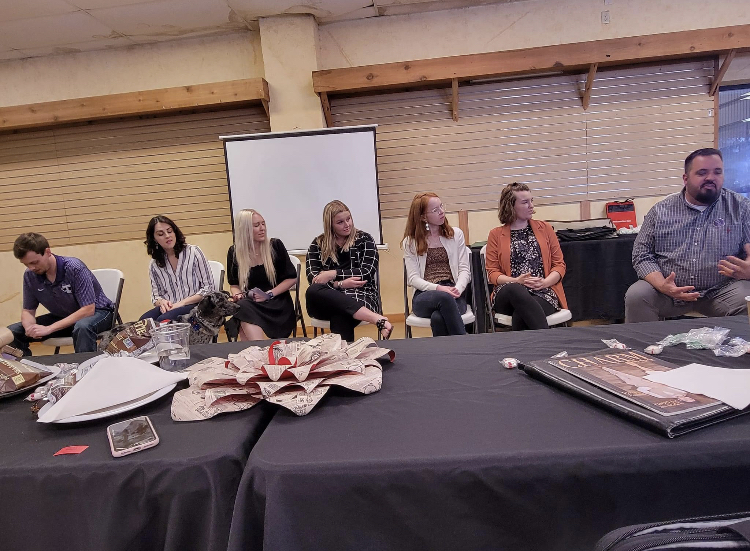Rural journalists in Texas and other states are invited to attend “Courage, Tenacity, Integrity and Innovation in Rural Journalism,” a free, one-day conference at the University of Texas on Feb. 29.
The meeting will feature two winners of the Tom and Pat Gish Award for courage, integrity and tenacity in rural journalism: 2023 winner Craig Garnett of the Uvalde Leader-News, and Laurie Ezzell Brown of The Canadian Record, who won the award with other family members in 2007.
They will appear on a morning panel with Randy Keck, editor and publisher of The Community News in Aledo. The panel will be moderated by Benjy Hamm, director of the Institute for Rural Journalism at the University of Kentucky, which will present the Gish Award to Garnett at the conference luncheon.
The afternoon panel will be moderated by Austin Lewter, director of the Texas Center for Community Journalism at Tarleton State University. It will focus on successful innovation in rural journalism and will feature Tara Huff of the Eagle Press in Hutchinson County; John Starkey of newly nonprofit Rambler Texas Media, which includes the Ozona Stockman in Crockett County; and Daniel Walker, who bought the Vernon Daily Record, Burkburnett Informer Star and Clay County Leader last year in May 2022 after editing the Vernon paper for 11 years.
The conference will be hosted at the Texas Union, 2308 Whitis Ave., by The Center for Ethical Leadership in Media of the UT School of Journalism and Media, directed by Drs. Kathleen McElroy and Mary Bock. It will begin at 9:30 a.m. and end at 3 p.m. A block of rooms will be available at the Moxy Austin-University.
“When Craig Garnett said he would like to receive the Gish Award in Texas, we realized that would be a wonderful opportunity to share the sort of work and dedication that is often needed to do good journalism in rural areas,” said Al Cross, director emeritus of the Institute for Rural Journalism. “Kathleen McElroy was very gracious to help us do that, and we are very glad to work again with the Texas Center for Community Journalism to help rural journalists in Texas.”
The event is free. Register here.
“Community journalism is alive and well in Texas and we are thrilled to help celebrate that,” Lewter said. “This event is of national significance and we expect a wonderful conversation among our panelists.”
Laurie Ezzell Brown
The Canadian Record
Laurie Brown’s family won the Institute for Rural Journalism’s Tom and Pat Gish Award for courage, integrity and tenacity in 2007, for their long record of investigative journalism and courageous editorials.
Brown stayed the course set by her father, Ben Ezzell, after he died suddenly in 1983 of a heart attack suffered while covering a Canadian High School football game. But she set a new rule: She would not write an editorial about a local topic that had not been covered in the weekly’s news pages.
Her focus was the well-being of Canadian, which in 2021 had a population of 2,248, and Hemphill County, pop. 3,271. She supported a private youth correctional facility to create jobs in a town defined by the ups and downs of oil and gas, and investments for the football stadium – after she met with the superintendent to secure refurbishing of the middle school’s auditorium. But she also wrote columns supporting Barack Obama and rebuking two racists who had come by her office to disparage him in 2008, calling on readers to accept the results of the 2020 election, and republishing the 2021 Associated Press investigative story that found little fraud in the election.
Brown’s views often run counter to those in Hemphill County, but her readers saw in the Record’s broad and deep news coverage an unmistakable commitment to the community, to the point that they paid $2 a copy for it in recent years. Her investigative reporting of Roberts County Attorney Rick Roach’s drug abuse and legal problems led to his narrow defeat when he ran for district attorney in 1996, and her investigation of large-scale hog farms led the Hemphill County commissioners to oppose tax incentives sought by the companies, which went elsewhere.
After Brown turned 65, she started looking for a suitable buyer. She found one, but the sale fell through because the buyer couldn’t find anyone willing to move to Canadian to edit and manage it. In early 2023, at 70, with another sale pending but complicated by a groundless lawsuit against the Record and other news outlets, she pulled out of the deal and stopped printing, saying later that she wanted to know her grandchildren better and not die on the job as her father did.
The Record continues on the web and Facebook, demonstrating Brown’s commitment to serve her community as she keeps looking for a new owner. She said at the National Summit on Journalism in Rural America in July that she doesn’t really like Facebook, but advertisers “see the traffic it’s getting,” and it’s filling a need: “There have been storms here and tornadoes and events like that that you just can’t ignore. They’re happening. We need to cover them. People look to us for information.” The Record published its annual high-school graduation edition, with photos of graduates, as a PDF.
Craig Garnett
Uvalde Leader-News
Craig Garnett won the 2023 Tom and Pat Gish Award for courage, integrity and tenacity in rural journalism for his coverage and commentary of the Uvalde school shooting and its aftermath, and for his longtime willingness to tell hard truths about things that matter in Uvalde County.
Garnett earned an economics degree from Southern Methodist University, joined the Fort Worth Star-Telegram, moved to the Kansas City Star, became general manager of the Leader-News in 1982 and owner and publisher in 1989. Under his leadership, the twice-weekly paper has won many awards.
In nominating Garnett for the Gish Award, Leader-News Managing Editor Meghann Garcia said his shooting coverage wasn’t the first time that he went against local opinion. Garnett editorialized against the Iraq War, opposed a pipeline that would send to San Antonio water needed for local agriculture, and opposed the idea of a separate school police force, which botched the response to the shooting.
“Craig has never been afraid of taking a stand or telling the news, despite how unpopular it might be with subscribers and advertisers, who are also often his friends,” Garcia wrote. And he has used his own family’s troubling experience as an example to give hope to others.
His wife, Melissa Garnett, recalled a column “about our son’s process of recovery from drugs and alcohol. That took courage. He must have hit all the right notes, as the response was great – he had taken the bold step of using his pain of an addicted child to remove the stigma of talking about addiction.”
The column celebrated their son’s year-plus of sobriety and said of those in thrall to opioids, “We should do all we can to help them discover a path because inside every addict lives someone’s treasured child, father, husband, brother or friend.”
After the shooting, Garnett spent hours “sitting with families who lost children, siblings, friends; interviewing survivors, teachers and students, about their experience,” Garcia wrote, saying he made a “dogged pursuit to learn how so many things went wrong that day, how every single fail-safe failed.”
In an editorial a month after the shooting, Garnett named names and was blunt: “No mass school shooting in the United States has ended with such glaring failures in both the law enforcement response and school district security. . . . Neither [school] Police Chief Pete Arredondo, acting city chief Mariano Pargas, Uvalde County Sheriff Ruben Nolasco nor any state or federal officer among the 376 responders to the scene was willing to take the helm of what was clearly a rudderless ship cast into a hurricane.”
A week later, another Garnett piece endorsing more gun control concluded: “I am not about to surrender my guns, and they are many, but I challenge you to give me one good reason (and please not the ‘slippery slope’ argument that did not come to pass when assault weapons were banned) why a teenager should have the firepower to stand down 376 lawmen. If disturbed young men are going to commit horrific crimes with firearms, why not take the most devastating amplifier out of the mass shooting equation?”
Tara Huff
The Eagle Press
A small weekly in the Texas Panhandle is growing exponentially.
Tara Huff has owned the Eagle Press in tiny Fritch, Texas, since 2010.
Fritch is in Hutchinson and Moore counties and boasts a population of 2,100. It is 15 miles west of the Hutchinson County seat, Borger, pop. 12,000. Hutchinson County is in the middle of the Panhandle and has a total population of just over 20,000 people.
The Eagle Press was founded in 1988 and Huff first went to work there in 1995.
“Initially, I sold ads and wrote a few stories,” Huff said. “I left the paper and came back a few times over the years.”
She was working there in 2010 when the opportunity for ownership came about.
“The people who had purchased the paper let it go back. The previous owner asked me if I wanted it,” Huff said. “I was going to have to find another job or buy the newspaper. So, I bought the paper.”
Since that time, the Eagle Press has been largely a one-woman shop with Huff involved in every aspect to operation.
“Of course, I rely on some wonderful community contributors,” Huff said. “I couldn’t do it without them.”
Until recently, the Press was officed in her house and she covered mainly the eastern half of the county.
But that has changed over the past two years.
“We are covering news different than anyone else in the county,” Huff said. “We offer a type of coverage that is different. We are community centered, and we are present. I am involved. I make an effort to cover meetings and events personally. And we are fair in our reporting.”
Huff said her readers are accustomed to quality reporting that is vetted, non-biased and accurate.
“When it comes down to it, I work hard, and my readers know it. They trust me to ask the tough questions,” Huff said.
Two years ago, the County Commissioners took notice and named the Eagle Press their official newspaper of record. Other entities have followed suit. Readership has grown along with Huff’s business.
“We are renting an office in Borger now,” she said. “We moved out of my house. We are growing. My biggest concern now is trying to hire people.”
The Press has grown circulation by 25% over the past 18 months and Huff is projecting more growth in 2024. “I am busy,” she said. “I’ve got to hire some folks.”
Huff is a West Coast native who found the Panhandle as young adult.
She began her media career at a Borger radio station and cites her journalism education to lot of own-the-job training.
“I look at other newspapers. That’s how I’ve learned,” she said. “I’ve studied newspapers like Canadian and Clarendon and am never afraid to ask questions.”
Randy Keck
The Community News, Aledo
When Randy Keck bought his weekly newspaper in Aledo 28 years ago, he was pretty much a rural journalist; east Parker County had one elementary school. Now it has seven, driven by growth west of Fort Worth, and he has a suburban newspaper with a static print circulation but a growing online audience that is 25 times larger than the print one, as measured by unique monthly visitors.
The area’s growth has brought both opportunities and challenges. When the school district proposed a bond issue a few years ago, it was opposed by a group that didn’t file its campaign-finance report on time, wouldn’t respond to inquiries from the paper and turned out to have the same address as a group running campaigns against the local state representative.
Keck wrote news stories and columns about that, and the bond issue passed.
It turned out that the group’s only contributor was a former state representative who had founded the group running campaigns against the incumbent legislator, financed mainly by two billionaires in West Texas, two “extreme, extreme, extreme, right-wing religious radicals who think you shouldn’t get elected to any public office in Texas unless you profess Christianity.”
In the 2022 primary, the group mounted radio and direct-mail attacks against Rep. Glenn Rogers, who won in a runoff with a recount over the more conservative Mike Olcott.
Before the election, Keck published charts showing where Rogers and Olcott got most of their money. The chart for Rogers was “a lot less complicated,” Keck says, because many of Olcott’s were funneled through several entities.
Since then, Rogers voted for Attorney General Ken Paxton’s impeachment and against Gov. Greg Abbott’s school-voucher plan, and in the March 5 primary he has the same opponent, who is endorsed by Abbott.
Keck says he is planning to double down on his coverage, doing fact-checks of campaign mailers. When a billboard went up saying Rogers had joined Democrats to impeach Paxton, Keck wrote a column pointing out that 75 percent of House Republicans had voted the same way.
Keck said he has made an editorial endorsement only once, when a mayoral candidate would have been a disaster for the city, which has many new residents who weren’t familiar with the candidates.
He said his approach to campaign coverage may have cost him a couple of advertisers, but says he’s “doing what has to be done.”
Keck, 63, has been president and chairman of the Texas Press Association, and represented Texas, Louisiana, Arkansas, Oklahoma, Kansas, and Missouri on the Board of Directors of the National Newspaper Association, and is treasurer of the NNA Foundation. He is a graduate of Midwestern State University.
John Starkey
Rambler Texas Media
John Starkey is no stranger to innovations in community journalism.
He has practiced the profession in one of the largest metropolitan markets in the country for 20 years.
He is the longtime owner of Rambler Texas Media. His company publishes The Rambler, in Irving, as well as the Ozona Stockman.
Starkey says community journalism in a metro area will force a publisher to be agile.
“We have a very small but committed readership,” he said. “They care about the community. They are engaged and active. It is the matter of funding our work that has become an issue. . . . There are no mom-and-pop businesses in our market. They are all chains and franchises. To businesses like this, the tradition advertising model is becoming less and less effective.”
With that in mind, Starkey took his business to a non-profit structure on Jan. 1, 2023.
“There are simply more possible revenue streams available by going non-profit,” he said. “It works for our businesses.”
Starkey says a nonprofit can more easily get revenue from sponsorships, memberships and events: “For-profit papers can host events too, but the community seems more willing to get behind an event hosted by a nonprofit.”
He thinks that’s because, once a newspaper goes the non-profit route, it is no longer owned by any single person. “The Rambler is now owned by the community,” he said. “We exist to promote the good of the community. . . . That is our mission.”
As a nonprofit, the newspaper can no longer endorse political candidates or take a side on political issues.
“We don’t even accept political advertising,” Starkey said. “We don’t have an opinion one way or the other. We can’t advocate for a candidate and the community has responded to this. They seem excited about us being required to be objective.”
Starkey bought the Irving Rambler in 2003 after a 13-year stint at the Dallas Morning News.
At the time, the city which serves as a geographical midpoint between Dallas and Fort Worth, had a population of 195,000.
Now, 20 years later, it is well over 250,000 with the surrounding cities and suburbs having grown just as fast.
They rebranded as the Rambler News in 2012 and expanded coverage into neighboring Coppell and Grand Prairie.
The shift to Rambler Texas Media came on Jan. 1, 2023, when they converted to non-profit.
The company expanded in June when the non-profit structure afforded Starkey the chance to save the 130-year-old Ozona Stockman from shuttering.
“The difference between Ozona and Irving is staggering,” Starkey said. “We are learning about rural journalism and the community has been receptive.”
Daniel Walker
Vernon, Texas
A North Texas editor turned owner is finding success and his new role — so much so that a neighboring town is offering incentives for them to expand their coverage.
Daniel Walker bought the Vernon Daily Record, Burkburnett Informer Star and Clay County Leader, in Henrietta, in May 2022.
He had served as the editor in Vernon in since 2011.
“When we got the chance to buy the papers, it was a no-brainer,” Walker said. “The community has responded. They see that we are putting down roots and that we will be here for the long term.”
Since the acquisition, Walkers’ group has purchased a building in Henrietta and is investing in their Burkburnett property.
They have added three fulltime news positions and expanded their sales force.
“More than anything, we are not afraid to experiment,” Walker said. “No idea is off the table. We don’t say ‘no’ and that is a value we instill in our staff.”
And it is getting noticed.
Late last year, the city manager of neighboring Iowa Park, Texas called Walker with a problem. His community has been without a newspaper since the Iowa Park Leader closed its doors in July 2022.
“He told me the community was lost without a newspaper,” Walker said.
“He said residents didn’t know where to get information. Facebook was not working. And businesses had no place to advertise to customers. He asked me what it would take to get a newspaper back in his town.”
True to his word, Walker didn’t say “no.”
He made a few calls and put a plan together. The city is kicking in some economic development money and a brand-new newspaper is set to launch in Iowa Park, Texas in February 2024.
As of press time, the new paper’s name is still up in the air.
“That’s the hardest part — picking a name,” Walker said. “We are still working on that.”
“More than anything, this is a testament to the importance of community journalism. Iowa Park lost their newspaper and the community suffered. We are excited to be part of the solution.”
Walker is a native of Arkansas. He began journalism career in 2001 at Community Newspaper Holdings Inc. newspapers in Oklahoma and Kansas before taking the helm of the newsroom at the Greenville Herald Banner prior to the move to Vernon.
“North Central Texas is home,” Walker says. “We are building something here and the sky is the limit.”
The Center for Ethical Leadership in Media
University of Texas at Austin
Founded in 2017 and now housed in the School of Journalism and Media and the Moody College of Communication at University of Texas at Austin, the Center equips today’s and tomorrow’s news leaders with the tools needed to respond to the rapid changes in the industry and to run newsrooms where all can succeed. The center is dedicated to fostering safe, fair and sustainable news media through its research, multi-disciplined curriculum and leadership training.
Directing the center are Drs. Kathleen McElroy and Mary Bock, each with extensive journalism experience, and Carolyn McGourty Supple, a co-founder and tech executive who is now senior advisor and board chair.
Institute for Rural Journalism
University of Kentucky
Part of the University of Kentucky School of Journalism and Media, the Institute has worked for 20 years to help rural journalists define the public agenda in their communities, through The Rural Blog and other efforts. It focuses on the sustainability of rural journalism and has sponsored the National Summit on Journalism in Rural America.
Benjy Hamm became director of the Institute in August, following founding director Al Cross, who remains a professor and director emeritus. Hamm was an editor for The Associated Press and The New York Times Co., editorial director of Landmark Community Newspapers and a journalism instructor at Campbellsville University in Kentucky.
Texas Center for Community Journalism
Tarleton State University
Housed at Tarleton State University, the Texas Center for Community Journalism is committed to the providing world class training to mid-level professionals at community newsrooms across the state.
The Center was founded in 2007 at Texas Christian University by director emeritus Tommy Thomason. It moved to Tarleton in 2019.
Austin Lewter was named director of the TCCJ in 2021. He is an instructor of journalism and broadcasting at Tarleton and faculty adviser for the student-led Texan News Service. Lewter and his wife Jennifer also own and operate the Whitesboro News-Record, a 150-year-old weekly in Grayson County.
